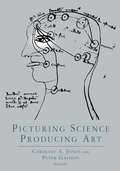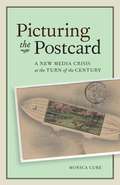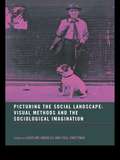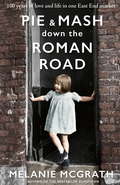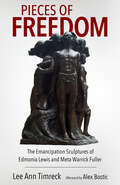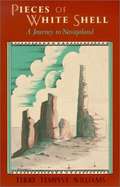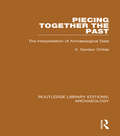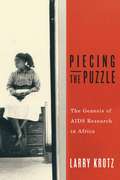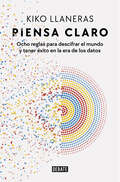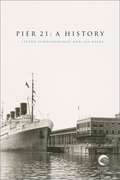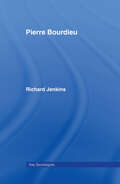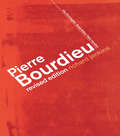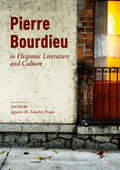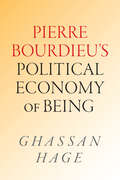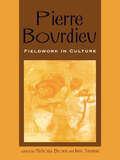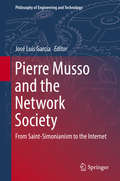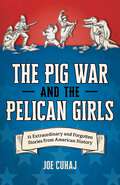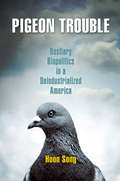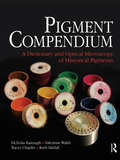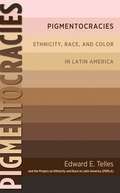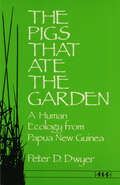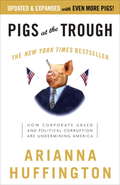- Table View
- List View
Picturing Science, Producing Art
by Peter Galison Caroline A. JonesFirst Published in 1998. Routledge is an imprint of Taylor & Francis, an informa company.
Picturing the Postcard: A New Media Crisis at the Turn of the Century
by Monica CureThe first full-length study of a once revolutionary visual and linguistic medium Literature has &“died&” many times—this book tells the story of its death by postcard. Picturing the Postcard looks to this unlikely source to shed light on our collective, modern-day obsession with new media. The postcard, almost unimaginably now, produced at the end of the nineteenth century the same anxieties and hopes that many people think are unique to twenty-first-century social media such as Facebook or Twitter. It promised a newly connected social world accessible to all and threatened the breakdown of authentic social relations and even of language. Arguing that &“new media&” is as much a discursive object as a material one, and that it is always in dialogue with the media that came before it, Monica Cure reconstructs the postcard&’s history through journals, legal documents, and sources from popular culture, analyzing the postcard&’s representation in fiction by well-known writers such as E. M. Forster and Edith Wharton and by more obscure writers like Anne Sedgwick and Herbert Flowerdew. Writers deployed uproar over the new medium of the postcard by Anglo-American cultural critics to mirror anxieties about the changing nature of the literary marketplace, which included the new role of women in public life, the appeal of celebrity and the loss of privacy, an increasing dependence on new technologies, and the rise of mass media. Literature kept open the postcard&’s possibilities and in the process reimagined what literature could be.
Picturing the Social Landscape: Visual Methods and the Sociological Imagination
by Caroline Knowles Paul SweetmanWe live in a visual culture, and visual evidence is increasingly central to social research. In this collection an international range of experts explain how they have used visual methods in their own research, examine their advantages and limitations, and show how they have been used alongside other research techniques. Contributors explore the following ideas:* self and identity* visualizing domestic space* visualizing urban landscapes* visualizing social change.The collection showcases different methods in different contexts through the examination of a variety of topical issues. Methods covered include photo and video diaries, the use of images produced by respondents, the use of images as prompts in interviews and focus groups, documentary photography, photographic inventory and visual ethnography.The result is an exciting and original collection that will be indispensable for any student, academic or researcher interested in the use of visual methods.
Pie and Mash Down the Roman Road: 100 years of love and life in one East End market
by Melanie McGrathG Kelly's Pie and Mash has been run by the same family in the Roman Road in Bow for nearly a hundred years; an East End institution and the still point of a turning world. Outside its windows the Roman Road has seen an extraordinary revolution - from women's liberation and industrialisation to wars and immigration - and yet at its heart it remains one of the last traditional market roads of London.Pie and Mash on the Roman Road is the biography of that shop and of the people - customers, suppliers, employees, owners - who passed through it, and continue to do so. Through vivid tales of ordinary lives the book will tell the extraordinary story of the community living around the oldest trading route in Britain, and the true heart of the East End.
Pie and Mash down the Roman Road: 100 years of love and life in one East End market
by Melanie McGrathSHORTLISTED FOR THE HWA NON-FICTION CROWN, THE ANDRÉ SIMON FOOD BOOK AWARDS AND THE FORTNUM & MASON BOOK AWARDS'Filled with hearty goodness and packed together with care, this will go down a treat' Evening Standard | 'Rich and compelling' Spectator | 'Extraordinary and very moving' Julian Fellowes | 'Beautifully written, carefully researched, wonderfully told' Danny WallaceThe fascinating history of an iconic East End institution from the bestselling author of Silvertown, Melanie McGrath. G Kelly's Pie and Mash has been run by the same family in the Roman Road in Bow for nearly a hundred years; an East End institution and the still point of a turning world. Outside its windows the Roman Road has seen an extraordinary revolution - from women's liberation and industrialisation to wars and immigration - and yet at its heart it remains one of the last traditional market roads of London.Pie and Mash down the Roman Road is the biography of that shop and of the people - customers, suppliers, employees, owners - who passed through it, and continue to do so. Through vivid tales of ordinary lives the book tells the extraordinary story of the community living around the oldest trading route in Britain, and the true heart of the East End.'Draws you right into the heart of the vibrant East End community' Rosie Hendry'Pacey and breath-taking . . . I loved every word' Carol Rivers
Pieces You'll Never Get Back: A Memoir of Unlikely Survival
by Samina AliA life-altering neurological disorder. A traumatic birth. An unlikely survival. Pieces You'll Never Get Back is a harrowing and redemptive memoir, in which a new mother must reconstruct her shattered mind, her relationship to her religious upbringing, and her life's purposeAt 29, as a young writer working on her first novel, Samina Ali nearly died giving birth to her son. Miraculously, she survived the unchecked eclampsia that had endangered her pregnancy, instead sustaining major brain injury and falling into a coma as she gave birth. When she woke up, only her deepest memories were intact. Her husband was a stranger to her, she didn&’t remember having a baby, and any language other than her native Urdu was foreign. Medical consensus was she would never recover—much less write—again. Advised to think of her brain as a shattered puzzle, Ali began the long and difficult journey of piecing herself back together: learning to walk, speak, and accomplish basic human tasks alongside her newborn. She attempted to reckon with her past identity as a writer and a wife, and her new identity as a mother. Despite her miraculous survival, the disconnect between the old and the new self was devastating. It would be three years before she felt remotely normal, and seven before she was mended and could fully connect with her son. Ali pairs the story of her &“death&” and recovery with the parallel narrative of her relationship to her Islamic upbringing and her fluctuating connection to her faith, incorporating meditations on religious narratives of death, the afterlife, resurrection, and reincarnation. Both deeply personal and steeped in religious thought, Pieces You'll Never Get Back is a uniquely propulsive, searching, and ultimately, inspiring work of memoir.
Pieces of Freedom: The Emancipation Sculptures of Edmonia Lewis and Meta Warrick Fuller (Margaret Walker Alexander Series in African American Studies)
by Lee Ann TimreckThe history of racism in America is also the history of ordinary Black Americans who accomplished extraordinary things in their pursuit of freedom. Faced with oppression throughout their journey, they built vibrant communities and lived purposeful lives. Pieces of Freedom: The Emancipation Sculptures of Edmonia Lewis and Meta Warrick Fuller brings that history to life by analyzing the first fifty years of Black freedom through the emancipation sculptures of two nineteenth-century African American sculptors, Mary Edmonia Lewis (1844–1909) and Meta Warrick Fuller (1877–1968).Lewis's and Fuller’s sculptures—and their visual narrative of a people’s strength and humanity in the face of oppression—present a textured historical diorama of Black life during an era of transformative, yet sorrowful, events. In this book, Lee Ann Timreck integrates Lewis's and Fuller’s visual narrative with oral narratives of the newly emancipated, all set within the historical context of Reconstruction, segregation, and Jim Crow. The sculptures also reflect the artists’ gendered perspective of emancipation, conveying a strong narrative on the contributions and sacrifices made by newly freed Black women. These emancipation sculptures provide both a historical narrative of the Black emancipation experience and a moral narrative of America’s failure to create a nation where “all men are created equal.” Pieces of Freedom challenges the twenty-first-century reader to learn and accept this history so we might address our nation’s lingering social and economic injustices.
Pieces of White Shell: A Journey to Navajoland
by Terry Tempest WilliamsSteeped in the lore of the Navajo reservation, where she worked as a teacher, the author came to see Navajo legend and ritual as touchstones for evaluating her own experience.
Piecing Together the Past: The Interpretation of Archaeological Data (Routledge Library Editions: Archaeology)
by V. Gordon ChildeOriginally published in 1956, this concise book brought together wisdom from V. Gordon Childe based upon 10 years of his lectures on the principles of archaeological classification, terminology and interpretive concepts. It examines meanings of technical terms and methodologies used in prehistoric archaeology, for those new to the area.
Piecing the Puzzle: The Genesis of AIDS Research in Africa
by Larry KrotzIn 1979, Dr. Allan Ronald, a specialist in infectious diseases from Canada, and Dr. Herbert Nsanze, head of medical microbiology at University of Nairobi, met through the World Health Organization. Ronald had just completed a successful project that cured a chancroid (genital ulcer) epidemic in Winnipeg and Nsanze asked him to come to Kenya to help with Kenya’s “sexual diseases problem.” That initial invitation led to a groundbreaking international scientific collaboration that would uncover critical pieces in the complex puzzle that became today’s HIV/AIDS pandemic. In Piecing the Puzzle, journalist and documentary filmmaker Larry Krotz chronicles the fascinating history of the pioneering Kenyan, Canadian, Belgian, and American research team that uncovered HIV/AIDS in Kenya, their scientific breakthroughs and setbacks, and their exceptional thirty-year relationship that began a new era of global health collaboration.
Piensa claro: Ocho reglas para descifrar el mundo y tener éxito en la era de los datos
by Kiko LlanerasESQUIVA LAS TRAMPAS DE TU INTUICIÓN Y TOMA DECISIONES MÁS ACERTADAS CON EL MEJOR MAESTRO DE LOS DATOS. ¿Qué secuencia de errores provocó la catástrofe de Chernóbil? ¿Cuál es el secreto de un superpronosticador? ¿Por qué tantosfutbolistas nacen en enero? HAZ QUE LOS DATOS TRABAJEN PARA TI. El mundo es un lugar complejo, y los datos nos ayudan a entenderlo. Los datos nos rodean. Se han convertido en un activo esencial, pero no solo para las empresas que se dedican a sacarles provecho, sino también para cualquier gobierno, institución o persona que quiera tomar mejores decisiones. Tanto si queremos escoger la escuela de nuestros hijos, como estudiar las ballenas, hacer fichajes de futbolistas o entender los grandes acontecimientos sociales y políticos, hoy es fundamental descifrar lo que nos dicen los números. Casi nada en nuestra vida vida quedará fuera. Cualquier cosa que nos interese, preocupe o seduzca puede beneficiarse de una mirada cuantitativa que resulta enormemente reveladora, valiosa y a menudo contraintuitiva. En el mar de opiniones alrededor de toda noticia que genere debate, sobresale la voz de Kiko Llaneras, que lleva años dedicado a ordenar, interpretar y explicar los datos con sensatez, con la mente abierta y con la mayor objetividad posible. En este libro generoso y deliciosamente útil, nos revela los trucos que le permiten analizar los datos de manera deslumbrante. En su lista de consejos hay atajos prácticos y advertencias contra trampas. Nos enseña a desconfiar de nuestra intuición, a eludir errores frecuentes y a hacer predicciones fiables, al tiempo que nos relata un sinfín de casos elocuentes y curiosos. ¿Por qué sabíamos que las vacunas funcionarían contra la covid? ¿Qué provocó lacatástrofe de Chernóbil? ¿Por qué Barack Obama dormía tan tranquilo? ¿Qué prejuicio ridículo frustró el fichaje de Marc Gasol? ¿Cuál es el secreto de un superpronosticador? ¿Por qué tantos futbolistas nacen en enero?
Pier 21: A History (Mercury)
by Jan Raska Steven SchwinghamerBetween 1928 and 1971, nearly one million immigrants landed in Canada at Pier 21 in Halifax, Nova Scotia. During those years, it was one of the main ocean immigration facilities in Canada, including when it welcomed home nearly 400,000 Canadians after service overseas during the Second World War. In the immediate postwar period, Pier 21 became the busiest ocean port of entry in the country. Today, people across Canada still enjoy connections to Pier 21 through family history and stories of arrival at the site. Since 1998, researchers at the Pier 21 Interpretive Centre and now the Canadian Museum of Immigration have been conducting interviews, reviewing archival materials, gathering written stories, and acquiring photographs, documents, and other objects reflecting the history of Pier 21. Pier 21: A History builds upon the resulting collection. It presents a history of this important Canadian ocean immigration facility during its years of operation and later emergence as a site of public commemoration. Published in English. Also available in French: Quai 21: Une histoire.
Pierre Bourdieu (Key Sociologists)
by Richard JenkinsThis short critical introduction to Pierre Bourdieu's thought is a model of clarity and insight. Where Bourdieu's own writings are often complex, even ambiguous, Richard Jenkins is direct, concise and to the point. He emphasizes Bourdieu's contributions to theory and methodology while also dealing in detail with his substantive studies of education, social stratification and culture. His book provides the best short English-language introduction to Bourdieu's work.'As Jenkins points out in the final pages of his book, criticism can be the sincerest form of flattery. I particularly relished his critical approach to the work of Bourdieu and believe that he has written a timely introduction which both undergraduates and experienced teachers will find stimulating and enjoyable.'- Mike Hepworth, University of Aberdeen
Pierre Bourdieu (Key Sociologists)
by Richard JenkinsThis short critical introduction to Pierre Bourdieu's thought is a model of clarity and insight. Where Bourdieu's own writings are often complex, even ambiguous, Richard Jenkins is direct, concise and to the point. He emphasizes Bourdieu's contributions to theory and methodology while also dealing in detail with his substantive studies of education, social stratification and culture. His book provides the best short English-language introduction to Bourdieu's work.'As Jenkins points out in the final pages of his book, criticism can be the sincerest form of flattery. I particularly relished his critical approach to the work of Bourdieu and believe that he has written a timely introduction which both undergraduates and experienced teachers will find stimulating and enjoyable.'- Mike Hepworth, University of Aberdeen
Pierre Bourdieu (Key Sociologists)
by Richard JenkinsThis short critical introduction to Pierre Bourdieu’s thought has been comprehensively brought up to date for the third edition. Where Bourdieu’s own writings are often complex, even ambiguous, Richard Jenkins is direct, concise and to the point. Emphasising Bourdieu’s contributions to sociological and anthropological epistemology, Jenkins also deals in detail with Bourdieu's substantive studies of education, social stratification, cultural consumption, language and rural society in transition. A model of clarity and insight, this book offers an accessible introduction to Bourdieu’s work for students, scholars and all those interested in social thought.
Pierre Bourdieu in Hispanic Literature and Culture
by Ignacio M. Sánchez PradoPierre Bourdieu in Hispanic Literature and Culture is a collective reflection on the value of French sociologist Pierre Bourdieu’s work for the study of Spanish and Latin American literature and culture. The authors deploy Bourdieu’s concepts in the study of Modernismo, avant-garde Mexico, contemporary Puerto Rican literature, Hispanism, Latin American cultural production, and more. Each essay is also a contribution to the study of the politics and economics of culture in Spain and Latin America. The book, as a whole, is in dialogue with recent methodological and theoretical interventions in cultural sociology and Latin American and Iberian studies.
Pierre Bourdieu's Political Economy of Being
by Ghassan HageIn Pierre Bourdieu’s Political Economy of Being, Ghassan Hage explores the great French social theorist’s work and revitalizes conventional and undertheorized aspects of his thinking. Hage focuses on Bourdieu’s concern with social being and what constitutes a worthwhile and fulfilling life. Such a life is not something that one either has or does not have; rather, society distributes and assigns values to ways of living. These values are structured by relations of power and domination and are subject to the outcome of political conflicts. Hage elucidates this political economy of being by reworking Bourdieu’s key concepts of habitus, illusio, symbolic capital, and field. In this political economy, people enjoy a worthwhile life to the degree that they are able to orient and deploy themselves practically in the world that surrounds them, have a sense of purpose, and achieve a level of social recognition. For Hage, the project of theorizing and understanding how people struggle to define, legitimize, and live a viable life in the face of symbolic domination permeates all of Bourdieu’s work.
Pierre Bourdieu: Fieldwork in Culture (Culture and Education Series)
by Nicholas Brown Imre Szeman&“The wide range of subjects . . . provides a glimpse of the extent to which Bourdieu&’s theories of culture have gained widespread currency in the humanities.&” —David Eick, SubStance The work of Pierre Bourdieu, one of the most influential French intellectuals of the twentieth century, has had an enormous impact on research in fields as diverse as aesthetics, education, anthropology, and sociology. Pierre Bourdieu: Fieldwork in Culture is the first collection of essays to focus specifically on the contribution of Bourdieu&’s thought to the study of cultural production. Though Bourdieu&’s own work has illuminated diverse cultural phenomena, the essays in this volume extend to new cultural forms and to national situations outside France. Far from simply applying Bourdieu&’s concepts and theoretical tools to these new contexts, the essays in this volume consider both the possibility and limits of Bourdieu&’s sociology for the study of culture. &“Worth the attention of those who seek to become familiar with Bourdieu or to engage with a more well-rounded familiarity with the usefulness of his social theory.&” —Christopher Lindsay Turner, MFS Modern Fiction Studies &“This sparkling and unusually coherent collection of essays emphasizes the American reception and adaptation of Bourdieu&’s work. It shows how Bourdieu has been resisted and embraced and discusses how his terms and methods might be both used and modified by American academics. Theoretical reflections are productively complemented by empirical investigations of non-canonical and popular artistic expressions and by discussions of the position of women in Bourdieu&’s thought.&” —Marshall Brown, University of Washington
Pierre Musso and the Network Society
by José Luís GarciaThis book is devoted to discussion of the views of Pierre Musso and starts with a central chapter written by Musso, entitled Network Ideology: from Saint-Simonianism to the Internet . Pierre Musso is a French philosopher and is one of the most original thinkers in the history of the network society. His thought develops a critique of information and communication technologies through their imaginary and social representations and of the information society, based on the network metaphor.The main question on which Musso has focused his attention is how the network metaphor is one of the most powerful ways of understanding the complex societies in which we live. Showing characteristic attention to detail, and drawing on the history of ideas, political philosophy and sociology, Musso traces the genealogy of the network imaginary, and points out that it did not emerge with the Internet. He shows how its modern roots can be found in Henri de Saint-Simon and his disciples, engineers and entrepreneurs such as Michel de Chevalier, and Barthélemy Prosper Enfantin, who developed channel networks, railroads, and the telegraphic network in France in the nineteenth century. In addition to the central piece written by Musso, the book includes a general introduction and six commentaries from experts on information technologies and networks. It displays a wide range of perspectives from a diverse set of authors in terms of nationalities and universities, as well as disciplinary backgrounds.
Pig War and the Pelican Girls: 21 Extraordinary and Forgotten Stories from American History
by Joe CuhajThe Pig War and the Pelican Girls is a riveting and well-researched collection of little-known and obscure tales from history. This page-turner unearths the stories of men and women who strove to save their country from aggressors or better the lives of others or simply survive under mysterious and extraordinary circumstances.From the tale of the Pelican Girls, a group of women deemed &“of virtuous character&” by the Catholic church and sent to the first French colonies in the New World in an attempt to re-create the Garden of Eden, to the story of &“The Limping Lady, &” declared the most dangerous of all Allied spies by the Germans in World War II, the true tale of Pan American Airlines signing up passengers for a flight to the moon when mankind had barely left Earth orbit, and many, many more, Joe Cuhaj reveals real-life history that has been buried for centuries. Whether you&’re an armchair historian or a lover of all things unusual and astonishing, this collection of obscure history shows that life surely is stranger than fiction.
Pigeon Trouble: Bestiary Biopolitics in a Deindustrialized America
by Hoon SongPigeon Trouble chronicles a foreign-born, birdphobic anthropologist's venture into the occult craft of pigeon shooting in the depths of Pennsylvania's anthracite coal country. Though initially drawn by a widely publicized antipigeon shoot protest by animal rights activists, the author quickly finds himself traversing into a territory much stranger than clashing worldviews—an uncanny world saturated with pigeon matters, both figuratively and literally.What transpires is a sustained meditation on self-reflexivity as the author teeters at the limit of his investigation—his own fear of birds. The result is an intimate portrayal of the miners' world of conspiracy theory, anti-Semitism, and whiteness, all inscribed one way or another by pigeon matters, and seen through the anguished eyes of a birdphobe. This bestiary experiment through a phobic gaze concludes with a critique on the visual trope in anthropology's self-reflexive turn.An ethnographer with a taste for philosophy, Song writes in a distinctive descriptive and analytical style, obsessed with his locale and its inhabitants, constantly monitoring his own reactions and his impact on others, but always teasing out larger implications to his subject.
Pigment Compendium: Optical Microscopy Of Historical Pigments
by Nicholas Eastaugh Valentine Walsh Tracey Chaplin Ruth SiddallThis is an essential purchase for all painting conservators and conservation scientists dealing with paintings and painted objects. It provides the first definitive manual dedicated to optical microscopy of historical pigments. Illustrated throughout with full colour images reproduced to the highest possible quality, this book is based on years of painstaking research into the visual and optical properties of pigments. Now combined with the Pigment Dictionary, the most thorough reference to pigment names and synonyms avaiable, the Pigment Compendium is a major addition to the study and understanding of historic pigments.
Pigmentocracies
by Edward TellesPigmentocracies--the fruit of the multiyear Project on Ethnicity and Race in Latin America (PERLA)--is a richly revealing analysis of contemporary attitudes toward ethnicity and race in Brazil, Colombia, Mexico, and Peru, four of Latin America's most populous nations. Based on extensive, original sociological and anthropological data generated by PERLA, this landmark study analyzes ethnoracial classification, inequality, and discrimination, as well as public opinion about Afro-descended and indigenous social movements and policies that foster greater social inclusiveness, all set within an ethnoracial history of each country. A once-in-a-generation examination of contemporary ethnicity, this book promises to contribute in significant ways to policymaking and public opinion in Latin America. Edward Telles, PERLA's principal investigator, explains that profound historical and political forces, including multiculturalism, have helped to shape the formation of ethnic identities and the nature of social relations within and across nations. One of Pigmentocracies's many important conclusions is that unequal social and economic status is at least as much a function of skin color as of ethnoracial identification. Investigators also found high rates of discrimination by color and ethnicity widely reported by both targets and witnesses. Still, substantial support across countries was found for multicultural-affirmative policies--a notable result given that in much of modern Latin America race and ethnicity have been downplayed or ignored as key factors despite their importance for earlier nation-building.
Pigs That Ate the Garden
by Peter D. DwyerIn The Pigs that Ate the Garden, Peter D. Dwyer examines the subsistence ecology of 109 Etolo people who live on the wet, forested mountain slopes of Papua New Guinea. Dwyer describes the community's method of deliberately placing pigs in gardens so that the pigs depredate the vegetation there. He shows how this practice is actually the community's method of sending a message to itself that serves to resynchronize a switch from sweet potato gardening to sago starch processing. The interrelationships of the different food-producing activities of the Etolo — gardening, hunting, tree-crop cultivation, etc. — are shown to have seasonal rhythms, and these rhythms maximize the Etolo's use of food resources at appropriate times and areas. Dwyer argues that the "shape" of Etolo ecology is ultimately driven by socio-cultural, rather than environmental, forces, and is set within a theoretical frame, concerning processes of communication and change in open systems.
Pigs at the Trough: How Corporate Greed and Political Corruption are Undermining America
by Arianna HuffingtonHuffington, author of and co-host of "Left, Right & Center," public radio's popular political roundtable program, catches corporate crooks in the act of bilking the public out of trillions of dollars, painting a wickedly witty portrait of how and why the greediest are running American business and government into the ground. Going beyond the Corporate Responsibility Act, she describes further reforms Americans must demand from Washington. Annotation ©2004 Book News, Inc., Portland, OR (booknews.com)
